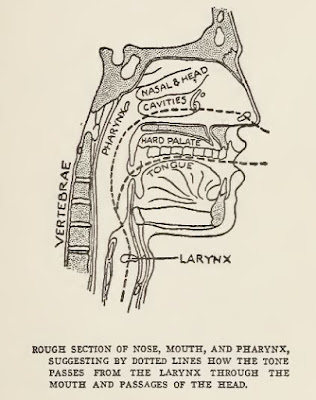PADRONANZA DELL'ORGANO DELLA LINGUA
<<The tongue is a veritable stumbling block in the path of the singer. The tongue is an enormous muscle compared with the other parts of the throat and mouth, and its roots particularly can by a slight movement block the passage of the throat pressing against the larynx. This accounts for much of the pinched singing we hear.
When the tongue forms a mountain in the back part of the mouth the singer produces what you call in English slang "a hot potato tone"--that is to say, a tone that sounds as if it were having much difficulty to get through the mouth. In very fact, it is having this difficulty, for it has to pass over the back of the tongue.
The would-be singer has to learn to control the tongue muscles and, above all things, to learn to relax the tongue and to govern it at will, so that it never stiffens and forms that hard lump which can be plainly felt immediately beneath the chin under the jaw.
The correct position of the tongue is raised from the back, lying flat in the mouth, the flattened tip beneath the front teeth, with the sides slightly raised so as to form a slight furrow in it. When the tongue is lying too low a lump under the chin beneath the jaw will form in singing and the tight muscles can be easily felt.
When the jaw is perfectly relaxed and the tongue lies flat in the mouth there will be a slight hollow under the chin and no stiffness in the muscles.
The tip of the tongue of course is employed in the pronunciation of the consonants and must be so agile that the minute it has finished its work it at once resumes the correct position.
In ascending the scale the furrow in the tongue increases as we come to the higher notes. It is here that the back of the palate begins to draw up in order to add to the resonance of the head notes, giving the cavities of the head free play.>>
<<La lingua è un vero e proprio ostacolo nel cammino del cantante. La lingua è un muscolo enorme in confronto alle altre parti della gola e della bocca, e le sue basi con un lieve movimento possono ostacolare particolarmente il passaggio della gola premendo contro la laringe. Questo influisce su gran parte del canto troppo stretto che si sente.
Quando la lingua forma una montagna nella parte posteriore della bocca il cantante produce quel che viene chiamato nel gergo inglese "un suono patata bollente"--vale a dire, una nota che suona come se avesse molta difficoltà a superare la bocca. Effettivamente, ha questa difficoltà, poiché deve oltrepassare il retro della lingua.
L'aspirante cantante deve imparare a controllare i muscoli della lingua e, più di ogni altra cosa, a rilassare la lingua e dominarla a piacimento, cosicché non si irrigidisca e formi quella massa dura che può essere chiaramente percepita al di sotto del mento sotto la mandibola.
La posizione corretta della lingua è sollevata dal retro, giacente distesa nella bocca, la punta appiattita al di sotto dei denti anteriori, con i lati leggermente sollevati così da formare un lieve solco in essa. Quando la lingua sta distesa troppo bassa si formerà nel cantare una massa sotto il mento al di sotto della mandibola e possono essere facilmente sentiti i muscoli tesi.
Quando la mandibola sarà perfettamente rilassata e la lingua giacerà distesa nella bocca ci sarà un lieve incavo sotto il mento e non vi sarà alcuna rigidità nei muscoli.
La punta della lingua, naturalmente, viene adoperata nella pronuncia delle consonanti e deve essere così agile da riprendere subito la posizione corretta nell'istante in cui ha terminato la sua attività.
Nel salire la scala il solco nella lingua aumenta quando si arriva alle note più acute. E' qui che il retro del palato inizia ad alzarsi al fine di ampliare la risonanza delle note di testa, dando alle cavità della testa libero gioco.>>
(tratto da: "Caruso and Tetrazzini on the Art of Singing" - Metropolitan Company, Publishers, New York, 1909)


























